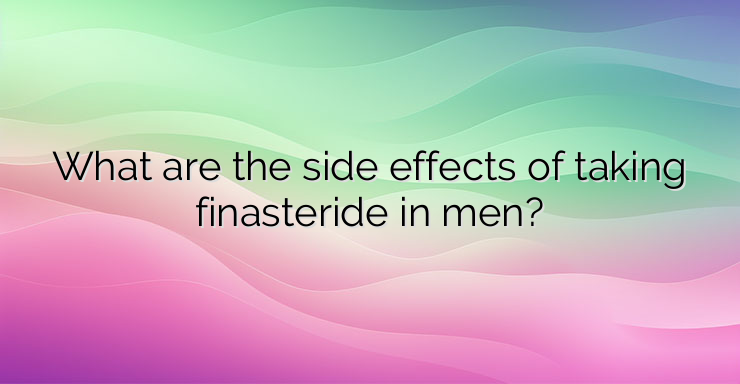What is finasteride? Finasteride is a prescription medication (testosterone-5-alpha reductase inhibitor) used to treat benign prostatic hyperplasia (BPH) and male pattern baldness (androgenic alopecia). Finasteride works by reducing the amount of the hormone dihydrotestosterone (DHT) in the body, which normally enlarges the prostate. Decreasing dihydrotestosterone levels helps prevent prostatic hyperplasia, also leading to increased hair growth and reduced hair loss. Hair growth in other parts of the body is not affected by the effects of finasteride. Finasteride is usually available as an oral tablet. As with other medicines, finasteride can cause side effects. What are the more common side effects of taking finasteride? Finasteride is more likely to cause certain side effects, some more common than others. These side effects may be temporary, lasting from a few days to weeks. However, if side effects persist for a longer time or become severe, consultation with a specialist is absolutely necessary. These are just some of the more common side effects reported by patients who took finasteride in clinical trials: Ejaculation problems; Tenderness in breast; Rash; Decreased libido (sexual desire); Erectile dysfunction What are the serious side effects of taking finasteride? Finasteride can cause serious side effects, which include: Prostate cancer Prostate cancer, in turn, can present with symptoms such as weight loss, problems urinating, and erectile dysfunction. Depression Depression is manifested by feelings of sadness or hopelessness, loss of interest in activities, changes in appetite. Post-finasteride syndrome It is possible for the patient to experience adverse reactions after stopping finasteride treatment. This condition is known as post-finasteride syndrome. Although post-finasteride syndrome was not reported during clinical trials of the drug, it became known after the drug was approved for use. Post-finasteride syndrome may occur when the drug is used to treat benign prostatic hyperplasia or androgenetic alopecia. Symptoms of post-finasteride syndrome may also include: Sexual problems, such as erectile dysfunction or decreased libido (sex drive); Depression; Anxiety; Suicidal thoughts Before stopping treatment with finasteride, it is necessary to consult a doctor in advance to determine the safest way to stop treatment. In addition, the specialist may recommend another treatment option for the given patient. Decreased libido Finasteride may decrease a man’s libido. This means that it may be noticed that the patient’s sexual desire is weaker than usual. Decreased libido is a common side effect of finasteride,reported in clinical trials. In some cases of decreased libido from taking the medication, ways to deal with this side effect may be recommended. In other cases, a different option may be recommended to treat the problem. Allergic reaction As with most medicines, finasteride may cause an allergic reaction in some patients. Although an allergic reaction was not observed in clinical trials, this does not exclude its occurrence. An allergic reaction in men taking finasteride has been reported since the drug was approved for use. Symptoms of an allergic reaction to the drug can be mild or severe and may include: Skin rash; Itching; Redness; Swelling usually of the eyelids, lips, hands or feet; Swelling of the tongue or throat, which can make breathing difficult. Finasteride can interact with other drugs. When taking two or more drugs, there is a risk of changing their action in the body. This can be harmful or interfere with the effectiveness of the treatment. To prevent drug interactions, a specialist must carefully monitor the effects of all medications that the patient is taking. Notifying the practitioner of any medications, vitamins, or herbs that the patient is taking should not be forgotten. References: 1. National Center for Biotechnology Information (NCBI). Finasteride and sexual side effects 2. Medical News Today. Finasteride side effects: What you should know 3. PubMed. Post-finasteride syndrome: a surmountable challenge for cliniciansFinasteride and sexual side effects 2. Medical News Today. Finasteride side effects: What you should know 3. PubMed. Post-finasteride syndrome: a surmountable challenge for cliniciansFinasteride and sexual side effects 2. Medical News Today. Finasteride side effects: What you should know 3. PubMed. Post-finasteride syndrome: a surmountable challenge for clinicians


Leave a Reply